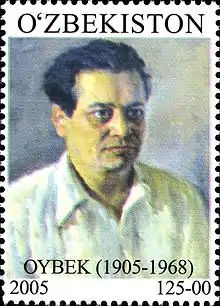Oybek | |
|---|---|
 Oybek on an Uzek stamp | |
| Born | Muso Toshmuhammad oʻgʻli January 10, 1905 Tashkent, Russian Turkestan |
| Died | July 1, 1968 (aged 63) Tashkent, Uzbek SSR |
| Occupation | Poet, writer and literary translator |
| Notable awards |
|
Muso Toshmuhammad oʻgʻli[1] (Russified form Musa Tashmukhamedov) (Uzbek: Muso Toshmuhammad oʻgʻli, Мусо Тошмуҳаммад ўғли) (January 10, 1905 – July 1, 1968), known by the pen name Oybek,[2][3] was an Uzbek, Soviet writer, poet and translator. He was the People's writer of the Uzbek SSR (1965), Academician of the Academy of Sciences of the Uzbek SSR (1943), winner of the Stalin Prize of the first degree (1946), member of the All-Union Communist Party of Bolsheviks (since 1948).[4] He was also a deputy of the Supreme Soviet of the USSR of the 5th and 6th convocations.
Biography
Muso Toshmuhammad oʻgʻli was born on December 28, 1904 (January 10, 1905) in Tashkent in a poor family of a weaver, who constantly roamed with his goods in the steppe and mountainous villages of the then Russian Turkestan. Sometimes his father took his son with him. The very impressionable and thoughtful boy listened to different stories and fairy tales with great pleasure.[5]
At that time, members of the poor class who wanted to educate their children could only go to elementary schools. The writer reflected his memories of this school in the story "Childhood" (1962), which was published in 1963. The story is a brilliant example of memoir literature. Oybek, following little Musa, step by step reveals his life path, shows the formation of his character, the formation of personality. Together with the changes in society, the moral ideals and views of the little hero change and his dreams and aspirations become more and more vivid.
As many uzbek writers, Oybek began his literary path with poetry. In 1923, his first poem "Whose Land?" was published. He is one of the first uzbek novelists. He wrote such works as: "Sacred Blood", "Navoi", "The Wind of the Golden Valley", "The Sun Will Not Fade", "The Great Way". He started writing as a student of the economic faculty of Central Asian State University, which he graduated from in 1930.
The writer's first major novel "Sacred Blood" (1943), is dedicated to the life of the peoples of Central Asia and Uzbekistan during the World War I. This novel was screened at the Uzbekfilm studio.
Since his youth, Oybek was fascinated by the works of the great uzbek poet and philosopher Ali-Shir Nava'i But before writing a work about him, the writer thoroughly studied and reviewed huge archival material. In the 1930s Oybek worked on the creation of the image of the great philosopher, poet and political figure Ali-Shir Nava'i. Oybek wanted Navoi's songs to fly over the earth like a nightingale.
In 1939 he wrote a poem about the great poet, and in 1943 he completed a novel in which Oybek showed Navoi only as a public and statesman. His creative path is mentioned only in passing and then only at the end of the book. The significance of the novel "Navoiy", as one of the best realistic works, goes far beyond the borders of uzbek literature. It has been translated into many languages, including russian.
During the years of persecution of Crimean Tatars Oybek supported the writer Şamil Aladin, helping him several times to get a job.[6] With his assistance, the crimean tatar press began to be published in Uzbekistan in the 1950s.
Oybek is the author of a number of studies, scientific articles, reviews: "The Creative Way of Abdulla Kadyri" (1936), "Uzbek Poetry of Recent Years" (1933), "Uzbek Literature" (1943), "Literature, History, Modernity" (1966).
Oybek is also known as a translator from russian into uzbek. He translated into uzbek such works as: "Eugene Onegin" by Pushkin, "Faust" by Goethe, "Masquerade" by Lermontov, Gorky, Homer (excerpts from "Iliad"), the epic "David of Sassoun", Belinsky and others.
He was engaged in a lot of public work, a member of the Writers Union of Uzbekistan. He was a deputy of the USSR Supreme Soviet of the 2nd convocation (1946-1950) and of the 5th-6th convocations (1958-1966).
Oybek died on July 1, 1968. He was buried in Tashkent at the Chigatai Memorial Cemetery.
A station of the Tashkent subway is named in Oybek's memory. The Kashkadarya Regional Uzbek Musical Drama Theater and Termez State Pedagogical Institute were also named after him.
Awards and prizes
- People's Writer of the Uzbek SSR (1965)
- Stalin Prize of the first degree (1946) - for the novel "Navoi" (1945).
- State Hamza Prize - for the book "Childhood" (1964)
- Two Orders of Lenin
- Order of the Badge of Honour (December 6, 1951)[7]
- Order "Buyuk Hizmatlari Uchun" (August 25, 2000)[8]
- Four other orders and medals
References
- ↑ "MUSO TOSHMUHAMMAD O'G'LI OYBEK TAVALLUDINING 100 YILLIGINI NISHONLASH TO'G'RISIDA". Lex (in Uzbek). 21 December 2004. Retrieved 22 November 2023.
- ↑ "Ойбек". Oʻzbekiston milliy ensiklopediyasi (in Uzbek). Vol. 6. Tashkent: Oʻzbekiston milliy ensiklopediyasi. 2003.
- ↑ "Таваллудига 118 йил тўлган адиб — Ойбекнинг уй-музейига саёҳат". Gazeta (in Uzbek). 10 January 2023. Retrieved 21 November 2023.
- ↑ Большая Российская энциклопедия: В 30 т. / Председатель науч.-ред. совета Ю. С. Осипов. Отв. ред С. Л. Кравец. Т. 1. А — Анкетирование. — М.: Большая Российская энциклопедия, 2005. — 766 с.: ил.: карт.
- ↑ "Айбек". Arboblar.uz (in Russian). Retrieved 2023-10-23.
- ↑ Ш. Алядин. Я ваш царь и бог
- ↑ "О награждении орденами и медалями работников литературы и искусства Узбекской ССР" (PDF). Archived from the original (PDF) on 2022-02-26. Retrieved 2023-10-24.
- ↑ "УП-2702-сон 25.08.2000. О награждении мастеров литературы и искусства, внесших огромный вклад в развитие узбекской национальной культуры". lex.uz. Retrieved 2023-10-24.